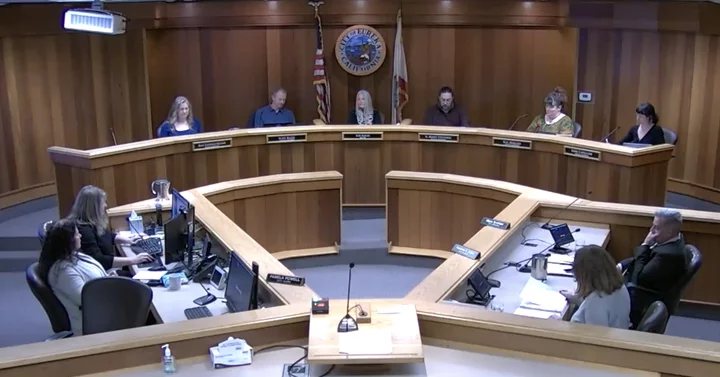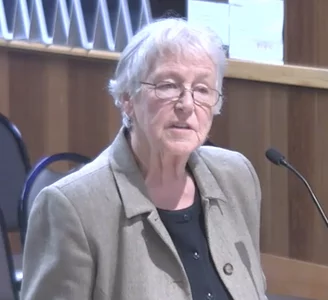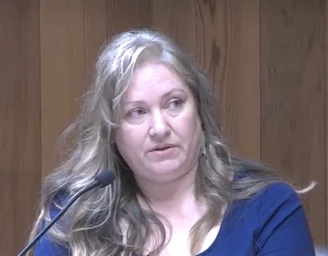Screenshot of Tuesday’s Eureka Council meeting.
###
During Tuesday’s regular meeting, the Eureka City Council approved a letter of opposition to Measure A, also known as the Humboldt Cannabis Reform Initiative, a countywide ballot initiative that would reshape local cannabis regulations.
If passed, the 38-page initiative would amend the county’s General Plan to restrict the size and number of new cannabis-growing operations across the county, ban mixed-light and indoor grows, and limit cultivation permits to one per person/corporation per parcel. It would also impose new rules for water storage, well-drilling, access roads, generators and more.
The Arcata City Council unanimously approved a letter of opposition to Measure A back in October. Just yesterday, the Trinidad Rancheria issued a letter of opposition to the ballot measure. The Hoopa Valley Tribe, on the other hand, offered its endorsement.
Eureka’s letter of opposition outlines the various ways the cannabis industry has benefited the city. “Since the legalization of adult-use cannabis in California in 2016, Eureka has become a hub for cannabis supply chain activities, including cannabis manufacturing, distribution, retail, and tourism,” the letter states. “These ancillary activities have generated hundreds of jobs and millions in economic activity in the city, and provide essential services to nearly 1,000 small-scale cannabis farmers in rural areas of the county.”
If passed, Measure A would “threaten to undermine Humboldt’s legal cannabis industry and reverse these hard-fought gains,” the letter continues.
Speaking during the public comment portion of Tuesday’s meeting, Measure A co-sponsors Elizabeth “Betsy” Watson and Mark Thurmond disputed claims that they had misled members of the public while gathering signatures to place the measure on the March 2024 ballot.
“One of the things that our opponents say is that this is not a transparent and public process,” Watson said. “[We received] 7,000 signatures. We beat the streets for four and a half months. … To write Measure A, we interviewed well over 100 people from different agencies, and what we found was that they had the same complaints that they had when the ordinance that now exists was made. … We didn’t dream this all up. We got it by doing research and interviews and interacting with the public.”
Several representatives of the local cannabis industry urged the council to oppose the initiative. Dylan Mattole, owner of Mattole Valley Sungrown and board president of the Humboldt County Growers Alliance (HCGA), said he has also spoken with agency representatives who say Measure A “is not workable.”
“We have piles of documents from agencies, from the Planning Department, from professionals, from biologists, from folks that have looked at Measure A, and [they] are telling us [as] experts in the field that this is bad policy,” Mattole said. “This is not going to achieve the goals that it says that it wants to achieve.”
Craig Johnson, co-owner of Alpenglow Farms, added that Measure A only applies to farms that are going through or have already gone through the compliance process, not illegal cultivators. “This is only addressing the legal farms that have put in the work to come through the front door to be regulated,” he said.
Jackee Riccio, executive director of Cannabis for Conservation, disputed the proponents’ claim that Measure A would promote environmentally responsible cannabis cultivation practices, adding that the document “utterly lacks in both environmental and scientific rigor.”
“It was not written by or with biologists or scientists, nor was professional environmental feedback requested, which is abundantly clear not only through the measures’ policy changes and conclusions but also from direct communications with state agencies and local nonprofits,” she said. … The implementation of the policies [listed in Measure A] would not result in the intended environmental benefits.”
Councilmember Leslie Castellano acknowledged the stress that local farmers have endured in recent years and made a motion to approve the letter of opposition. Councilmember Kati Moulton seconded the action.
Councilmember G. Mario Fernandez said he could see where the proponents of Measure A were coming from but said, “It’s that potential impact that is really going to hurt the industry.”
Councilmember Renee Contreras-DeLoach said she had spoken with “a variety of civic leaders” and local tribal representatives about the potential consequences of Measure A and ultimately determined that she would not support the letter of opposition. “One of the issues I’m kind of uncomfortable with is [the city council] weighing in on this,” she said. “A lot of the cultivation doesn’t really necessarily happen in Eureka. We’re mostly retail. I think that this is something that [is] important for the voters to go ahead and decide.”
Contreras-DeLoach also expressed concern for environmental degradation and “growing issues” with abandoned permitted farms. “One of the people [I spoke with] said, ‘We’ve got 20 years ahead of us of cleaning up these sites as people go under and leave them.’ And I think that’s something that we need to keep in mind.”
Mayor Kim Bergel acknowledged that she could not vote on the matter but expressed her emphatic support for the struggling cannabis industry.
“I’ve watched the courage of local farmers and the people in our community that have come forward and really taken a huge, huge risk … with their families and their lives to become legitimate, to become a part of our community and a part of our society,” she said. “I don’t think that these folks have put their time and energy to become legitimate for them to be kicked in the teeth. [They] didn’t come this far forward to just cut them off at the knees.”
Bergel noted Contreras-DeLoach’s point about abandoned farms and asked, “Why have they gone out of business? Because we don’t support them in a way that I believe we should.” Bergel said that was her personal opinion and not necessarily that of the council or anybody else.
Contreras-DeLoach maintained her position on the matter and said she had spoken with people in enforcement who said there are legally permitted growers who are “circumventing some of the rules.” She added that all local businesses need support, not just cannabis.
After a bit of additional discussion, the motion passed 3-1, with Contreras-DeLoach dissenting and Councilmember Scott Bauer — a scientist with the California Department of Fish and Wildlife — recused.
###
PREVIOUSLY:
- An Initiative to Reshape Humboldt’s Cannabis Industry Qualified for the Ballot, and It Has Growers Worried
- Supes Agree to Put Controversial Weed Initiative on 2024 Ballot, Though They Hope to Work With Organizers on Alternatives
- Humboldt County Cannabis Farmers Blast ‘Misleading’ Ballot Initiative That Would Impose New Restrictions on Cultivators; Supervisors Form an Ad Hoc Committee to Work on Alternatives
- Proponents of the Humboldt Cannabis Reform Initiative Are Calling Out the Board of Supervisors, County Staff for Allegedly Distorting the Intent of the 2024 Ballot Measure
- Another Day of Cannabis Reform Initiative Panic at the Board of Supes; It’s Now All But Certain That Voters Will Decide on the Controversial Measure on the March 2024 Ballot
- ‘Cannabis Reform Initiative’ Legal Challenge Filed: Small Farmers, Industry Reps Ask the Court to Kick Next Year’s ‘Measure A’ Off the Ballot
- Arcata City Council Unanimously Opposes Measure A, the ‘Humboldt Cannabis Reform Initiative’
- Pressured by Upcoming Ballot Measure, County Supervisors Look to Improve Existing Cannabis Regs
- Proponents and Opponents of Measure A, the Humboldt Cannabis Reform Initiative, Square Off at a Public Forum in Arcata
- Judge Denies Effort to Keep Measure A, the ‘Humboldt Cannabis Reform Initiative,’ Off the March Ballot



CLICK TO MANAGE